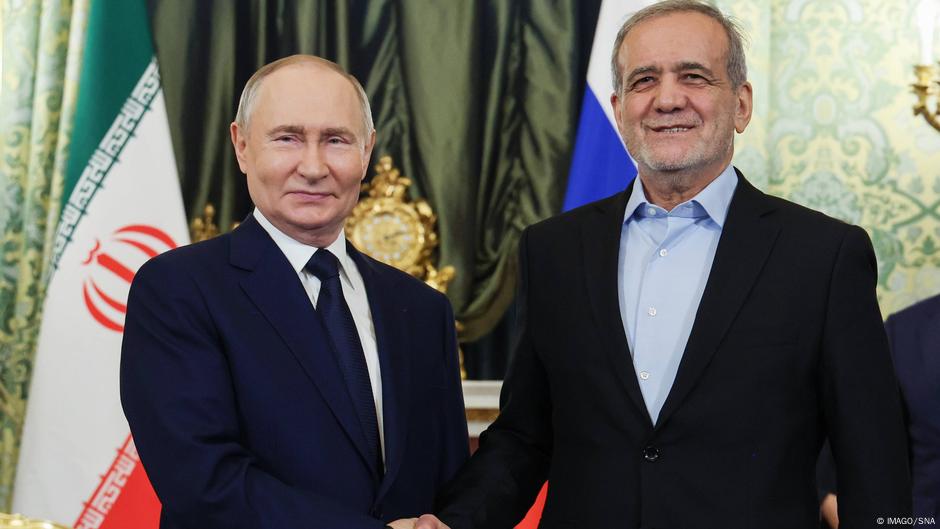Russia and Iran have established a long-standing economic and strategic partnership. However, despite a newly signed defense agreement, it appears unlikely that the Kremlin will extend military assistance to Iran in its escalating conflict with Israel.
In response to Israel’s recent assaults on Iran’s nuclear installations, Russian President Vladimir Putin has engaged with international leaders regarding the situation. Following the onset of Israel’s attacks last Friday, Putin reached out to both Iranian President Masoud Pezeshkian and Israeli Prime Minister Benjamin Netanyahu, according to a Kremlin statement.
During these discussions, the Russian leader conveyed his condolences to the people and leadership of Iran over the significant loss of life, while also condemning Israel’s actions as violations of the UN Charter and international law.
The following day, Putin reiterated his condemnation of Israel’s operations during a conversation with US President Donald Trump, a firm ally of Netanyahu. Despite the deepening ties between Russia and Iran, analysts indicate that the Kremlin is hesitant to provide direct military support to its ally.
The Kremlin’s rebuke of Israel is aligned with the economic relationship between the two nations, particularly as both face heavy sanctions from Western countries. Iran recently joined BRICS, a coalition of emerging economies initially founded by Russia, reinforcing their alliance. Their partnership has strengthened further since Russia’s full-scale invasion of Ukraine in February 2022, amid accusations that Iran has supplied Moscow with military drones used in Ukraine. Reports suggest that Russia may have compensated Iran with over 1.8 tons of gold, valued at approximately $104 million, to facilitate these drone transactions. Additionally, Iran has sought Russian assistance to advance its nuclear ambitions.
According to Ruslan Suleymanov, a Middle Eastern analyst based in Cairo, “The Kremlin is acting according to an old Quranic principle: ‘Fight and wage war, but do not transgress.’ In other words, Moscow, which has its interests and presence in the Middle East, would prefer to avoid any kind of uncontrollable chaos in the region.”
In light of Israel’s recent strikes on Iranian facilities, the Iranian parliament ratified the Treaty on Comprehensive Strategic Partnership with Russia. Initially signed by both countries’ presidents in January and subsequently approved by the Russian parliament, this treaty, despite its ambitious title, does not establish a mutual defense pact requiring military assistance in the event of aggression. Instead, it merely obligates both nations to refrain from supporting each other’s adversaries.
Marianna Belenkaya, a Middle Eastern analyst who has relocated to Israel post-Ukraine war, asserts that Russia is highly unlikely to grant direct military aid to Iran in an official capacity. “It has no need to, especially as it is trying to restore or improve relations with Washington, although some behind-the-scenes involvement can’t be ruled out entirely,” she explained.
Moreover, Belenkaya noted that Putin genuinely aims to position Russia as a mediator in the Israel-Iran conflict. Reports suggest that the Russian leader advised Iran’s supreme leader, Ali Khamenei, to engage in negotiations last year. Recently, Trump expressed openness to Russia’s potential role as mediator.
Belenkaya believes Russia may not exert the same level of pressure on Iran as the US, but it can facilitate communication between the parties involved. In the event of indirect negotiations between the US and Iran in April, Russia was anticipated to play a significant mediating role, particularly if a nuclear deal progressed. The Guardian had reported that Moscow might serve as a safe location for Iran’s stockpile of highly enriched uranium, acting as an impartial arbiter in the event of any violations of the agreement. Should such a deal emerge, it would alter the roles of Germany, France, and the UK as guarantors under the 2015 Iran nuclear pact, from which Trump withdrew the US in 2018.
As these geopolitical tensions unfold, experts suggest the Kremlin benefits from the West’s preoccupation with the Middle East, even as it escalates its conflict in Ukraine. Recently, Russia launched one of its most lethal assaults on Kyiv in months, resulting in 14 fatalities and numerous injuries.
Concurrently, the G7 leaders are addressing the escalations in the Middle East during their ongoing summit in Canada. German Chancellor Friedrich Merz had noted that this issue would be a significant focus. An earlier meeting between Trump and Ukrainian President Volodymyr Zelenskyy has been canceled following Trump’s premature exit from the G7 summit.
Suleymanov underscored the advantage for the Kremlin in diverting American and European leaders’ attention from Ukraine, suggesting, “Against this backdrop, Putin may seize the opportunity to launch an offensive or cause some other kind of trouble.”

